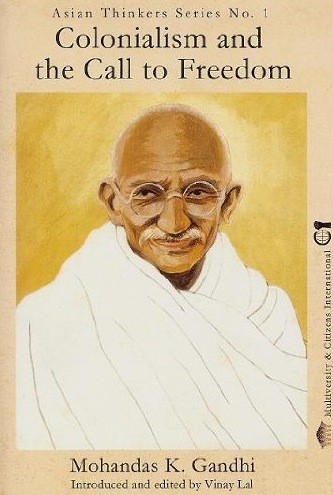Guest Editorial: Nonviolence, A Gaping Hole in Postcolonial Thought
by Vinay Lal

Cover art courtesy Vinay Lal
The enterprise of making a nation is fraught with violence. People have to be not merely cajoled but browbeaten into submission to become proper subjects of a proper nation-state. Overt violence may not always play the primary role in producing the homogenous subject, but social phenomena such as schooling cannot be viewed merely as innocuous enterprises designed to ‘educate’ subjects of the state. One of the most widely cited works to have put forward this argument with elegance and scholarly rigor is Eugen Weber’s Peasants into Frenchmen, where one learns, with much surprise, that even in the Third Republic, “French was a foreign language for half the citizens.” The making of France entailed not only the modernization of the rural countryside but creating, often with violence, proper subjects of a proper nation-state. The making of the United States offers another narrative of the role of violence in the production of the nation-state, with the extermination of Native Americans long before and much after the ‘Revolutionary War’ constituting the most vital link in the long chain of violence that marked the emergence of the United States.
Postcolonial thought, attentive as always to the politics of nation-making and nationalism’s complicity with colonialism, bestowed considerable attention on the various phenomena that can be accumulated under the rubric of violence; however, it had almost no time to spare for a pragmatic, ethical, or even philosophical consideration of nonviolence. The violence of the nation-state may have always been present to the mind of postcolonial theorists, but generally this was reduced to the violence of the colonizer. One thinks, of course, of Fanon, Cesaire, Memmi, and many others in this respect. In those works that have underscored the complicity of nationalist and imperialist thought, a principal motif in the work (say) of Ranajit Guha, the violence of indigenous elites also came under critical scrutiny. (See, for example, Guha’s Elementary Aspects of Peasant Insurgency in Colonial India, Durham, North Carolina: Duke University Press, 1999) It is characteristic of most social thought in the West that it has been riveted on violence – here, postcolonial thought barely diverged from orthodox social science, mainstream social thought, or the general drift of humanist thinking. Nonviolence is barely present in intellectual discussions. We see here history’s continuing enchantment with ‘events’; nonviolence creates little or no noise, it merely is, it only fills the space in the background.
One of the many genuine insights at which Gandhi arrived was the recognition that the practitioners, theorists, and ardent believers in nonviolence in Europe and America had become entirely marginal to dominant intellectual traditions of the West. The Tolstoy who turned to anarchism and nonviolence was seen as having betrayed the finest humanist traditions that he had once embodied; Thoreau was dismissed as a freak; and Edward Carpenter was reduced to obscurity. That the supreme novelist of 19th century Europe, feted and celebrated not only in aristocratic and learned circles but in the much wider and emerging public sphere, should have turned to philosophical anarchism, renouncing his own works and embracing a political view of Christianity that put him in the path of confrontation with the Russian Orthodox Church, is something that passed the comprehension of Tolstoy’s contemporaries. Gandhi was similarly inclined to view Christianity as a firm repudiation of Christ’s teachings on nonviolent resistance, though what role Tolstoy had in shaping Gandhi’s conception of Christianity remains uncertain.
The point cannot be reinforced enough: nonviolence has never had any salience in Western thought, and postcolonial thought has in this respect scarcely deviated from the intellectual traditions of the West. Once we leave aside Indian scholars such as Partha Chatterjee and Ashis Nandy, for whom Gandhi perforce has had an inescapable presence, we find that post-colonialism in the Western academy never had the slightest truck with the histories and practices of nonviolence. The fetish for violence manifested itself in a sustained interest in Fanon among postcolonial theorists; but Gandhi has long seemed, shall we say, unsexy in the extreme.
The case of Edward Said is instructive: though he had gotten in the habit of furnishing lists of anti-colonial thinkers and texts to his readers, Gandhi remained singularly uninteresting to him. It is informative that in a voluminous collection of interviews with Edward Said, edited by Gauri Viswanathan (Power, Politics and Culture: Interviews with Edward W. Said, New York: Pantheon, 2001) the name of Martin Luther King, Jr. appears twice: but where King is remembered around the world chiefly and justly as one of the chief architects of the civil rights movement, the preeminent prophetic voice of an aggrieved black America, Said mentions him both times only (and I should say without any just cause) as an unequivocal supporter of Zionism. Many have pointed to the fact that the oppression of the colonizers was much more visible to Said than the resistance to colonial rule; but, even within the canvas of resistance, the idea of nonviolent resistance, and its histories, was not even remotely on Said’s horizon.
Nonviolence has been a gaping hole in postcolonial thought, and this alone points us to the irrepressible and uncomfortable truth of the deep structuring of violence in the entire edifice of modern Western thought.
EDITOR’S NOTE: Vinay Lal is Professor of History and Asian American Studies at UCLA. He writes widely on the history and culture of colonial and modern India, popular and public culture in India (especially cinema), historiography, the politics of world history, the Indian diaspora, global politics, contemporary American politics, and the life and thought of Mohandas Gandhi. He is the author or editor of over fifteen books. His exceptional blog site gives a full biography, and list of his publications. It is regularly updated with a wealth of articles on India and Gandhi.




